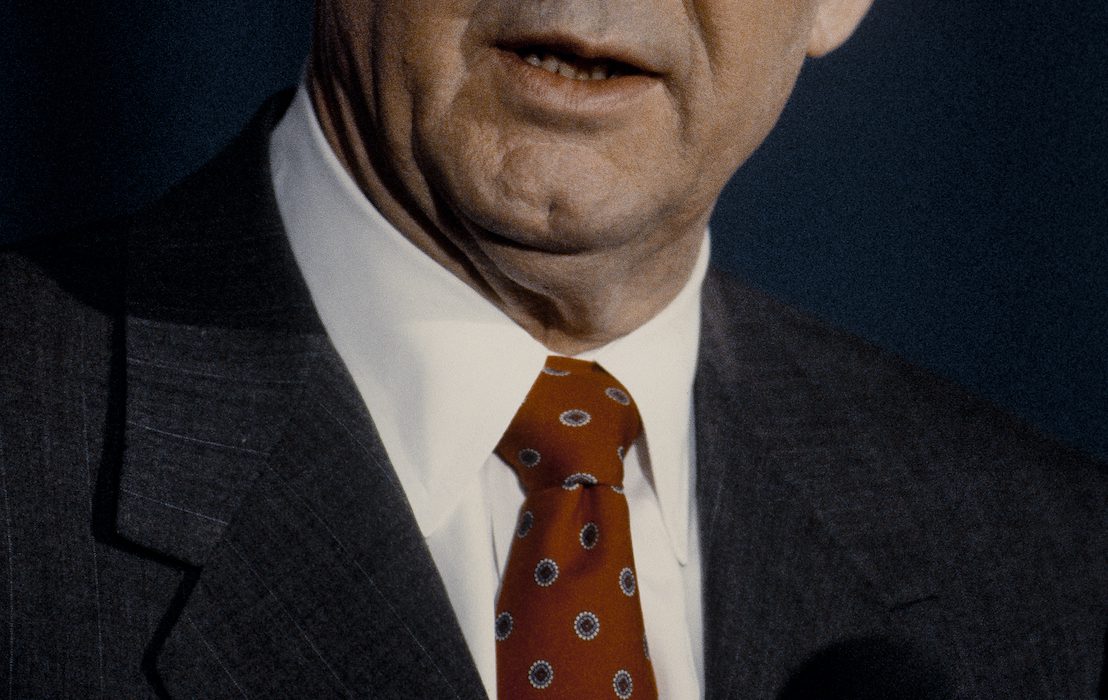Where Gordon Gekko and Pat Buchanan Meet
As the prospect of the next recession stalks the country, it is worth re-examining the meaning of “greed is good.”

HOLLYWOOD—Everyone knows the credo of Oliver Stone’s all-time villain. “Greed is good.”
The director's unmatched portrayal of the 1980s' man-on-the-make in Wall Street's Gordon Gekko is the stuff of legends. To political poindexters, Gekko’s sermon at the board meeting would seem the most famous and obvious homily to a kind of anarcho-capitalism.
Stone’s archvillain (or is it antihero?) is Milton Friedmanism incarnate. In other words, the market is justice.
Less often considered today is the full set-up to the fictional financier’s diatribe.
Gekko: “Well, ladies and gentlemen, we're not here to indulge in fantasy, but in political and economic reality. America, America has become a second-rate power. Its trade deficit and its fiscal deficit are at nightmare proportions.”
Gekko then gets flirtatious with industrial policy: “Now, in the days of the free market, when our country was a top industrial power...”
Gekko goes on to assail bureaucracy, in all its forms: “One thing I do know is that our paper company lost $110 million last year, and I'll bet that half of that was spent in all the paperwork going back and forth between all these vice presidents.”
“The new law in corporate America seems to be: survival of the unfittest,” Gekko proclaims. “Well, in my book, you either do it right, or you get eliminated.”
And then he closes with his famous lines, the stuff frankly of modern Shakespeare (in terms at least of contemporary political relevance):
The point is, ladies and gentlemen, that greed—for lack of a better word—is good. Greed is right. Greed works. Greed clarifies, cuts through, and captures the essence of the evolutionary spirit. Greed, in all of its forms—greed for life, for money, for love, knowledge—has marked the upward surge of mankind. And greed—you mark my words—will not only save Teldar Paper, but that other malfunctioning corporation called the USA.
Now to crib from perhaps the second-most famous film about Wall Street in the Eighties, I’ll invoke American Psycho's Patrick Bateman: “Is that Donald Trump’s car?”
Admittedly, the concept of a paleoconservative Gordon Gekko is a novel one. The man is supposed to be the “libertarian” dream. Add in Gekko’s dubious ethnicity (the consensus seems to be probably atheistic Jewish from a working-class background). Mix in the fraught history between sectors of the “paleos” and some American Jews and the state of Israel, and the intellectual pairing may veer to some on the truly absurd.
But in this era of species-level existential crisis, cryptocurrency crashes, and political realignment, it is worth noting the coalitions of old are ultimately indecipherable to anyone who did not live through it (and this writer did not, the 1980s). The past is a foreign country. And more importantly, money isn’t real. With the first inflation shock since before Gekko’s heyday, that everyone seems to be in agreement on.
As by now most seasoned readers know, “deregulation,” in the Fukuyaman sense, was supposed to create an implicitly center-right society: desultory narcotic use would be naturally discouraged because it would harder to show up to the office; large family formation was impressive and a way to get ahead in your career; power in the hands of private companies meant minimal bureaucracy; the “upward surge” of the society as Gekko put it, would be undisputedly felt, even by the haters and losers. The fact that involved a country, “a corporation” as Gekko called it, with an industrial capacity and rules of behavior, seemed self-evident to Gekko.
And what is Francis Fukuyama up to these days, anyway? Frank is predicting on his blog that Vladimir Putin is a sure goner, unbowed by the years, 1992-2022. Trust the process.
Potshots aside, it is worth re-exploring the nature of 1980s right-wing criticism of what has come to be summarized as “Reaganism.” Gekko’s soliloquy occurs in 1987; while he probably voted for the man, and personally thrilled and benefited from Reagan’s optimism and successes at human liberation, Gekko hardly sounds like a totally happy supporter of the 40th president, his assessment of the country being then still quite dour.
Subscribe Today
Get daily emails in your inbox
Let’s cast aside the comparably unremarkable sequel film from 2010—what would Gekko say now? Well, shifting back to Bret Easton Ellis now, Bateman’s crony Timothy Bryce (in the film version) remarks of Reagan: “He makes himself out to be a harmless old codger.” Another right-wing critic of Reagan’s interpretation of laissez-faire? The 45th president.
“But this…is the last chance for these ideas,” Pat Buchanan told Tim Alberta in the early Trump years in power. At bottom, Gekko Gordon is a political animal like “Pitchfork Pat,” who was of-course the co-founder of The American Conservative. The man of the film is drawn toward macro-philosophizing like Buchanan was drawn to the presidency.
One does wonder what Buchanan thinks now. In the second-most famous monologue of the film, a more baleful Gekko comes to an end by saying: “Now you’re not naive enough to think we’re living in a democracy, are you buddy?”
Comments